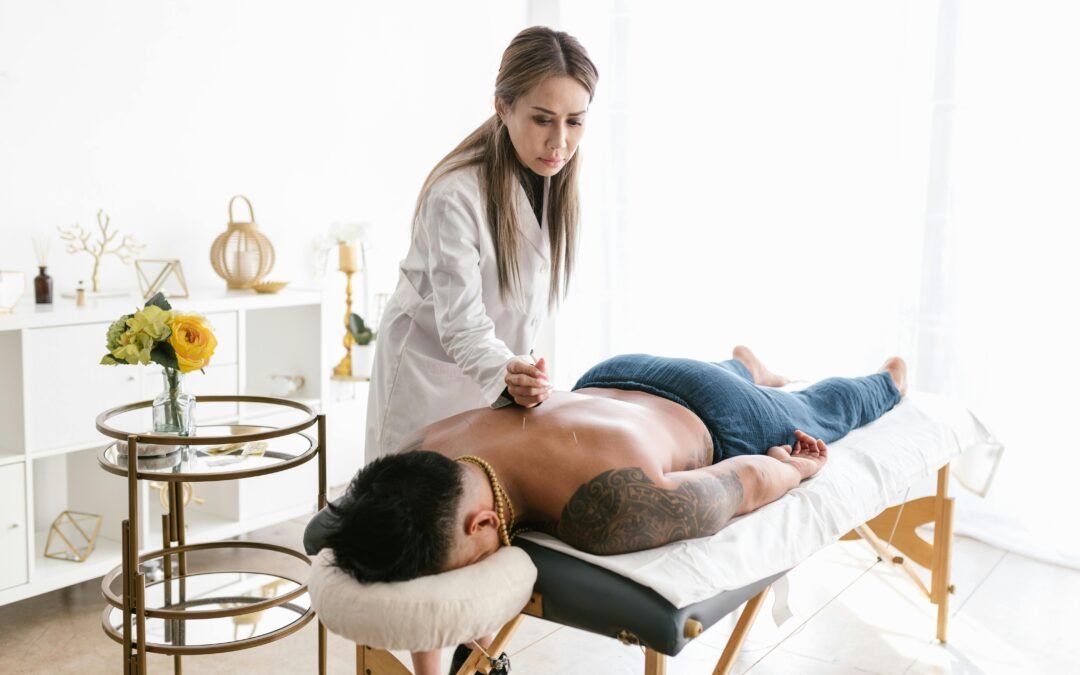Traditional Chinese Medicine and IBD
Living with inflammatory bowel disease often feels like navigating uncharted waters. When I was first diagnosed, I relied on traditional medical recommendations – Budesonide and Remicade. While these were initially essential to bring me out of a flare, I couldn’t help but wonder if there were other natural ways to support my gut and reduce inflammation.
That curiosity led me to explore Chinese medicine and acupuncture, which has been an essential part of managing IBD and stress. As a dietitian and someone living with IBD, I want to share my experience, the potential benefits of these ancient practices, and how they might help you too.
What is Chinese Medicine and Acupuncture?
Chinese medicine is a holistic system of health that’s been practiced for thousands of years. It views the body as an interconnected whole, aiming to restore balance and harmony. The treatments often include:
– Acupuncture: The use of thin needles to stimulate specific points on the body, promoting healing and energy flow (also known as Qi).
– Herbal Medicine: Custom formulas designed to address unique symptoms and underlying imbalances.
– Diet Therapy: Recommendations based on Chinese principles of warming, cooling, and nourishing foods.
Learn more about Traditional Chinese Medicine here.
When it comes to acupuncture, I was unsure and skeptical at first. The idea of tiny needles didn’t sound relaxing! But after a few sessions, I realized how calming the experience could be, and I began noticing subtle changes in my gut and how I felt.
How Acupuncture Helped My IBD Symptoms
One of the most surprising benefits of acupuncture was how it helped with my stress levels. Stress has always been a major trigger for my IBD flares, and acupuncture seemed to calm my nervous system in a way I hadn’t experienced before.
Here’s what I noticed:
- Reduced Pain and Cramping: My abdominal pain seemed to ease after each session.
- Improved Digestion: I had fewer days with bloating, nausea and urgency.
- Better Sleep: Acupuncture helped me sleep more deeply, which in turn supported my immune system and energy levels.
Studies suggest that acupuncture may help reduce inflammation by modulating the immune system, which could explain why it made such a difference for me. In a 2022 study, acupuncture was found to help patients with active Crohn’s disease go into remission and stay in remission. Acupuncture was linked to an increase in anti-inflammatory bacteria in the gut, a stronger intestinal barrier, and a reduction of inflammatory markers.
Chinese Herbal Medicine and IBD
Alongside acupuncture, my practitioner recommended a custom herbal formula tailored to my symptoms. These blends often include herbs like:
– Licorice Root: Known for its anti-inflammatory properties.
– Huang Qi (Astragalus): Traditionally used to strengthen the immune system.
– Baishao (White Peony Root): Believed to support digestion and reduce cramping.
Herbal medicine is highly individualized, so what worked for me might not be right for you. It’s essential to work with a licensed Traditional Chinese Medicine practitioner who understands IBD and can customize your treatment.
The Science Behind Chinese Medicine for IBD
Research on Chinese medicine and acupuncture for IBD is still evolving, but there are some promising findings:
– Acupuncture: Studies have shown it can reduce inflammation, improve gut motility, increase beneficial gut bacteria and lower stress—all of which are critical for managing IBD.
– Herbal Medicine: Certain formulas have been shown to reduce symptoms of diarrhea and abdominal pain in people with IBD.
While these therapies may not be a solo replacement for conventional treatments, they can complement your existing plan and improve gut health.
What to Expect from Acupuncture and Chinese Medicine
If you’re considering acupuncture or Chinese medicine, here’s what to expect:
- An Initial Consultation: Your practitioner will ask detailed questions about your symptoms, lifestyle, and even emotions. This helps them create a personalized treatment plan.
- Acupuncture Sessions: Don’t worry—the needles are incredibly thin and typically painless. Sessions last about 30–60 minutes, and many people find them relaxing.
- Herbal Recommendations: If you’re prescribed herbs, your practitioner will explain how to prepare and take them. Be sure to inform your doctor to avoid potential interactions with medications.
Tips for Finding the Right Practitioner
When exploring Chinese medicine or acupuncture for IBD, it’s essential to work with someone who’s experienced in treating digestive conditions. Here’s how to find a qualified provider:
– Look for a licensed acupuncturist (LAc) or Chinese medicine practitioner in your local area
– Check reviews and ask if they’ve treated IBD patients before
– Be sure to ask about insurance coverage. Some health plans cover up to 12 acupuncture sessions per year.
My Final Thoughts on Chinese Medicine and Acupuncture for IBD
Chinese medicine and acupuncture aren’t magic fixes, but they’ve been a valuable part of my IBD toolkit. They’ve helped me manage stress, reduce symptoms, and feel more connected to my body.
If you’re curious about trying these therapies, approach them with an open mind and realistic expectations. They work best as part of a comprehensive plan that may include your medications, diet, and other treatments.
Have you tried Chinese medicine or acupuncture for IBD? Let me know in the comments—I’d love to hear about your experience!

